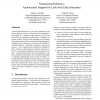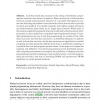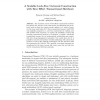16 search results - page 2 / 4 » Lock Free Data Structures Using STM in Haskell |
ISCA
1993
IEEE
13 years 9 months ago
1993
IEEE
A shared data structure is lock-free if its operations do not require mutual exclusion. If one process is interrupted in the middle of an operation, other processes will not be pr...
PPOPP
2006
ACM
13 years 11 months ago
2006
ACM
Applications need to become more concurrent to take advantage of the increased computational power provided by chip level multiprocessing. Programmers have traditionally managed t...
HIPC
2004
Springer
13 years 10 months ago
2004
Springer
Abstract. Lock-free shared data structures in the setting of distributed computing have received a fair amount of attention. Major motivations of lock-free data structures include ...
WDAG
2010
Springer
13 years 3 months ago
2010
Springer
The imminent arrival of best-effort transactional hardware has spurred new interest in the construction of nonblocking data structures, such as those that require atomic updates to...
CATS
2008
13 years 6 months ago
2008
Lock-free algorithms have been developed to avoid various problems associated with using locks to control access to shared data structures. These algorithms are typically more int...




